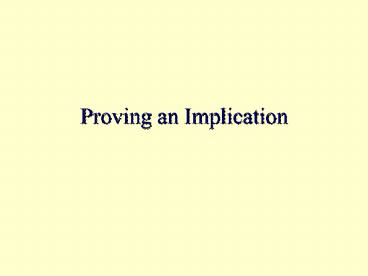Proving an Implication - PowerPoint PPT Presentation
1 / 15
Title:
Proving an Implication
Description:
Proving an Implication. 9 Common Methods. Proofs generally entail proving an implication. ... Vacuous proof of p q: If you show that p is false, then you are done. ... – PowerPoint PPT presentation
Number of Views:89
Avg rating:3.0/5.0
Title: Proving an Implication
1
Proving an Implication
2
9 Common Methods
- Proofs generally entail proving an implication.
- Here are 9 common methods
- Trivial proof of p ? q
- If you can prove q without assuming p, then p ? q
is called trivial. - This situation rarely arises.
- Vacuous proof of p ? q
- If you show that p is false, then you are done.
- This situation rarely arises.
3
Direct proof of p ? q
- Assume that p is true.
- Using that, show that q is true (perhaps using
other information) by valid inference. - Example Prove (a ? Z, 3 a - 2) ? (3 a2-1).
- 3 a 2 (Assumption)
- a - 2 ? 0 modulo 3.
- a ? 2 modulo 3.
- 4. a2 ? 1 mod 3.
- a2 - 1 ? 0 mod 3.
- 3 a2 - 1.
4
9 Common Methods ...
- Indirect Proof of p ? q
- Direct proof of the contrapositive
- Assume q.
- Using that, show p by valid inference.
- Proof of p ? q by contradiction
- (p ? q) (p ? q).
- Show that (p ? q) p ? q is false.
5
Proof by Contrapositive
- n ab, for a, b ? ? ? a ? n1/2 ? b ? n1/2 .
- 1. Assume a gt n1/2 ? b gt n1/2 .
- 2. Then, ab gt n.
6
Proof by Contradiction Example
- 1, 2, , 10 are placed randomly in a circle ? the
sum of some 3 adjacent numbers ? 17. - 1. Assume 1, 2, , 10 are placed randomly in a
circle and the sum of no 3 adjacent numbers ? 17. - 2. x1 x2 x3 ? 16
- x2 x3 x4 ? 16
- x10 x1 x2 ? 16
7
- 3. 3(x1 x2 . . .x10) ? 10 ? 16.
- 4. 3(x1 x2 . . .x10) 3(1 2 10) 3
? 55, a contradiction. - Which 3 adjacent numbers have this big sum?
- This is called a non-constructive proof.
8
9 Common Methods ...
- Proof of p ? q by cases
- Let p p1 ? p2 ? . . . ? pn.
- (p1 ? p2 ? . . . ? pn )? q (p1 ? q) ? (p2 ? q)
? . . . ? (pn ? q). - Thus, you can prove the compound implication by
proving each of the single implications. - Why do you have to prove all of them?
- This form is rare.
9
9 Common Methods ...
- Proof by elimination of cases
- (p ? (q1? q2? . . . ?qn) ? q1? q2? . . . ?
qn-1) ? (p ? qn) . - For example, if p implies q1 ? q2, and q1 is
false, then p implies q2.
10
Proof by elimination of cases
- Prove p is an odd prime ? p has the form 6n 1
or 6n 5 or p 3. - 1. Assume p is an odd prime.
- 2. p / 6 has only 6 possible remainders.
- 3. p thus is of the form 6n, 6n 1, , or 6n
5. - 4. Since p is odd, eliminate 6n, 6n 2, and 6n
4. - 5. Since p is prime, eliminate 6n 3 and p ? 3.
(Since in that case 3 p) - 6. Only 6n 1, 6n 5, and p 3 remain as
possibilities.
11
9 Common Methods ...
- Conditional proof
- p ? (q ? r) (p ? q) ? r.
- Java style tip
- if (p)
- if (q)
- r
- can be rewritten
- if (p q)
- r
12
9 Common Methods ...
- Proof of equivalence (if and only if)
- p ?q (p ? q) ? (q ? p).
- In other words, prove 2 cases
- p if q (i.e., q ? p)
- p only if q (i.e., p ? q)
13
Proof of Equivalence
- 2 integers a b have the same remainder when
divided by positive integer n iff n a - b. - The only if part
- 1. Assume 2 integers a b have the same
remainder when divided by positive integer n. - 2. Show n a - b.
- 3. Let a nj r, for 0 ? r lt n.
- b nk r, for 0 ? r lt n.
- 4. Then, a - b n(j - k), a multiple of n.
14
The if part
- 1. Assume n a - b.
- 2. Show 2 integers a b have the same remainder
when divided by positive integer n. - 3. a - b ni, for some integer i.
- 4. Let a nj r1, for 0 ? r1 lt n.
- b nk r2, for 0 ? r2 lt n.
- 5. a - b ni. (By assumption)
- 6. a ni b ni (nk r2) n(i k) r2 .
- 7. But, r1 is the unique remainder of a / n.
- 8. ? r1 r2.
15
Characters
- ? ? ? ? ?
- ? ? ? ? ? ? ?
- ? ? ?
- ? ?
- ? ? ? ? ?
- ? ? ? ? ? ? ? ? ?































